This article was co-authored by Chad Denman. Dr. Chad Denman is a Sleep Medicine Provider and is the Owner of Sleep Cycle Center in Austin, TX. With over ten years of experience and over 500 hours of Continuing Education in Sleep, he specializes in identifying and offering multiple treatment options to patients suffering from sleep issues. Additionally, he previously treated patients as a general dentist for over a decade! Dr. Denman completed his Doctor of Dental Surgery degree at Marquette University and earned an undergraduate degree in Exercise Physiology from Florida State University. He’s also a member of the American Academy of Sleep Medicine (AASM), the American Dental Association, and the Academy of General Dentistry. In addition, Dr. Chad is the Director of Doctor Success for the International Academy of Sleep (IAOS). There, he coaches other dentists on how they can become healthcare entrepreneurs and lectures nationwide on the importance of treating sleep apnea.
This article has been viewed 273,527 times.
If you tend to sleep on your back at night, it can be difficult to get comfortable. Many sleep specialists do not advise sleeping on your back, especially if you are light sleeper or tend to snore. However, if sleeping on your back is your go-to position, you can make your nights more comfortable by adjusting your sleep environment and adjusting your sleep habits.
Steps
Adjusting Your Sleep Environment
-
1Elevate your head with pillows. Using one to two pillows to raise your head four inches will make it easier for you to breathe as you sleep. You may also want to consider buying pillows that are specially designed to keep your neck muscles relaxed and open, allowing you to get a more comfortable sleep.[1]
- Sleeping with your head elevated can be especially helpful for those who have sleep apnea or acid reflux.
- You may need to try sleeping on one to two pillows for a few nights to determine how many pillows you require to be comfortable when sleeping at night. You may want to consider orthopedic pillows that conform to your neck and head and provide good support as you sleep. Wedge-shaped foam pillows can also support your head and help you breathe properly when you sleep on your back.
-
2Sleep with pillows under your knees. Sleeping on your back can put stress on your spine and your lower back. Place one to two pillows under your knees before you go to bed so that your spine is properly supported and there is less stress placed on your lower back.[2]Advertisement
-
3Ensure your mattress is comfortable and supportive. When you are sleeping on your back, it is essential that your mattress provides good full-body support, including lower back support. In a mattress, support is provided through the coils or inner springs. Different mattresses will have different arrangements and numbers of coils. As well, the padding of the mattress can come in different thicknesses, from seven to 18 inches deep. You should always try a mattress before buying it to ensure it is comfortable and supportive for your body.[3]
- Often, a medium firm mattress is more comfortable as it allows your shoulders and hips to sink in slightly. If you have lower back pain, you may want to consider a firmer mattress with a padded cover for support.
- Check your existing mattress to make sure it does not sag at all or cause you any discomfort. If so, it may be time to invest in a new mattress. Though you can use boards underneath the mattress to help with the sagging, this is a temporary fix and you will eventually need to buy a new mattress to get a good night's sleep.
-
4Invest in a humidifier. Dry air can irritate your nose and throat and lead to congestion and snoring at night. To keep the sleeping environment comfortable and moist, sleep with a humidifier on. You can find humidifiers at your local hardware store.[4]
Adjusting Your Sleep Habits
-
1Do not eat or drink alcohol several hours before bed. Alcohol is known to cause restless and disturbed sleep.[5] As well, eating a heavy meal right before bed can lead to restless sleep, causing snoring and constant moving or shifting in bed.[6]
- Try to only drink water a few hours before bed and eat dinner several hours before bedtime. This will ensure your body has had time digest your food and is ready for a good sleep.
-
2Wind down before you go to bed. To help you prepare for bed, do a relaxing activity like taking a long bath, reading a book, or having a quiet discussion with your partner. Winding down before bed will help you get comfortable and ease into sleep.[7]
- You may also want to have a warm beverage, like herbal tea, before bed. Avoid any beverages that contain caffeine, as this will only keep you up at night.
-
3Consider eventually rolling over onto one side. Though you may begin your night sleeping on your back, you may want to consider rolling over to one side as you start to fall asleep or if you wake up in the middle of the night. Sleeping on your back can lead to snoring and restless sleep. If possible, try to roll to one side so your body is more comfortable and able to sustain a deep sleep throughout the night.[8]
Expert Q&A
-
QuestionDoes sleeping on your back make sleep apnea worse?
 Chad DenmanDr. Chad Denman is a Sleep Medicine Provider and is the Owner of Sleep Cycle Center in Austin, TX. With over ten years of experience and over 500 hours of Continuing Education in Sleep, he specializes in identifying and offering multiple treatment options to patients suffering from sleep issues. Additionally, he previously treated patients as a general dentist for over a decade! Dr. Denman completed his Doctor of Dental Surgery degree at Marquette University and earned an undergraduate degree in Exercise Physiology from Florida State University. He’s also a member of the American Academy of Sleep Medicine (AASM), the American Dental Association, and the Academy of General Dentistry. In addition, Dr. Chad is the Director of Doctor Success for the International Academy of Sleep (IAOS). There, he coaches other dentists on how they can become healthcare entrepreneurs and lectures nationwide on the importance of treating sleep apnea.
Chad DenmanDr. Chad Denman is a Sleep Medicine Provider and is the Owner of Sleep Cycle Center in Austin, TX. With over ten years of experience and over 500 hours of Continuing Education in Sleep, he specializes in identifying and offering multiple treatment options to patients suffering from sleep issues. Additionally, he previously treated patients as a general dentist for over a decade! Dr. Denman completed his Doctor of Dental Surgery degree at Marquette University and earned an undergraduate degree in Exercise Physiology from Florida State University. He’s also a member of the American Academy of Sleep Medicine (AASM), the American Dental Association, and the Academy of General Dentistry. In addition, Dr. Chad is the Director of Doctor Success for the International Academy of Sleep (IAOS). There, he coaches other dentists on how they can become healthcare entrepreneurs and lectures nationwide on the importance of treating sleep apnea.
Sleep Medicine Provider Yes—sleeping on your back generally worsens your sleep apnea symptoms, as this causes the soft tissues in the back of your throat to collapse; however, this is not always the case. The only way to know which sleep position gives you the best night's sleep is to have a sleep test. Elevating your bed or having an adjustable bed can reduce snoring and acid reflux, but depending on the severity of your sleep apnea, that may not work, either.
Yes—sleeping on your back generally worsens your sleep apnea symptoms, as this causes the soft tissues in the back of your throat to collapse; however, this is not always the case. The only way to know which sleep position gives you the best night's sleep is to have a sleep test. Elevating your bed or having an adjustable bed can reduce snoring and acid reflux, but depending on the severity of your sleep apnea, that may not work, either.
Expert Interview

Thanks for reading our article! If you'd like to learn more about sleeping on your back, check out our in-depth interview with Chad Denman.
References
- ↑ http://www.helpguide.org/articles/sleep/how-to-stop-snoring.htm
- ↑ https://www.urmc.rochester.edu/encyclopedia/content.aspx?ContentTypeID=1&ContentID=4460
- ↑ http://www.spine-health.com/wellness/sleep/choosing-best-mattress-lower-back-pain
- ↑ http://www.helpguide.org/articles/sleep/how-to-stop-snoring.htm
- ↑ https://health.clevelandclinic.org/why-you-should-limit-alcohol-before-bed-for-better-sleep/
- ↑ https://share.upmc.com/2015/11/is-it-bad-to-sleep-after-a-meal/
- ↑ https://www.heart.org/en/healthy-living/healthy-lifestyle/sleep/how-to-sleep-better-with-a-bedtime-routine
- ↑ http://www.helpguide.org/articles/sleep/how-to-stop-snoring.htm
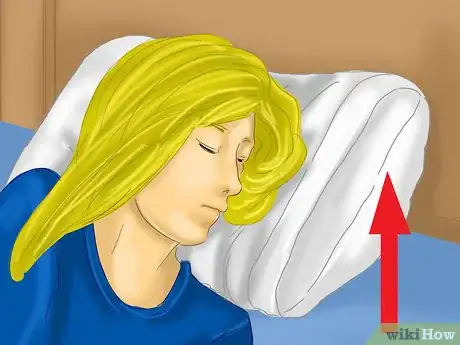

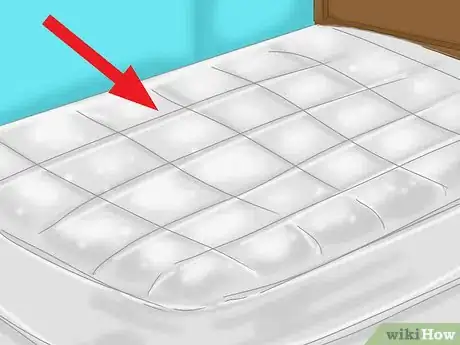



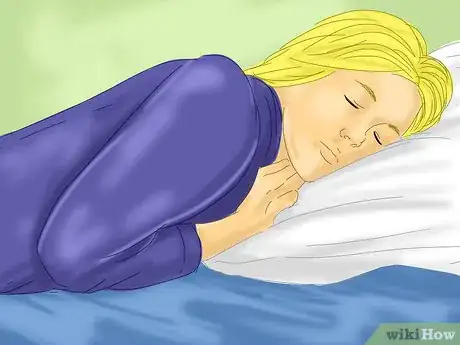

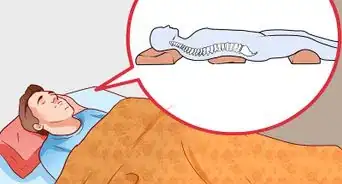



















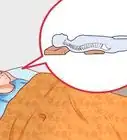





































Medical Disclaimer
The content of this article is not intended to be a substitute for professional medical advice, examination, diagnosis, or treatment. You should always contact your doctor or other qualified healthcare professional before starting, changing, or stopping any kind of health treatment.
Read More...